Ngamba Island Chimpanzee Sanctuary: Top wildlife experience
Hiding in the shiny waters of Lake Victoria, Ngamba Island is not merely a refuge - it is an inspiring eco-minded tourist destination and a sanctuary for wildlife enthusiasts. The sanctuary is located just 23 kilometers outside of Entebbe, Uganda and is the home of more than 50 orphaned and rescued chimpanzees that now live in a safe, forested sanctuary.
- Why tourists love visiting Ngamba
- Getting to Ngamba Island
- Sanctuary background and mission
- What tourists can expect
- The stars of the Sanctuary - The chimpanzees
- Accommodations on the Island
- Visitor information & pricing
- Volunteer and educational opportunities
- Nearby attractions for itinerary planning
- Tips for a smooth visit
- FAQs (Tourist-centric)
- Conclusion
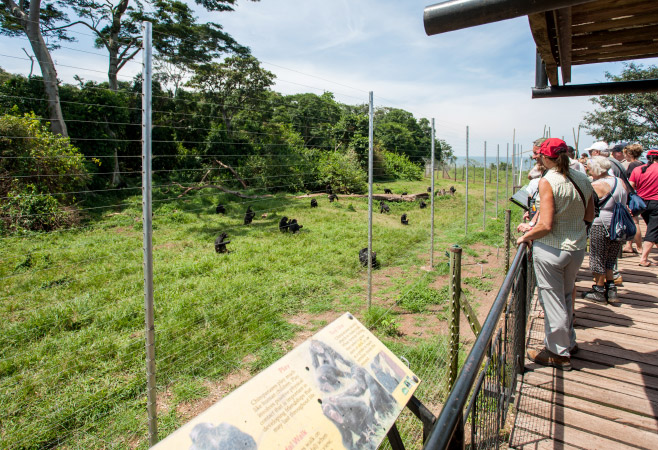
Unidentified tourists at Ngamba Island Chimpanzee Sanctuary, on Ngamba Island, Lake Victoria, Uganda
Why tourists love visiting Ngamba
Why is Ngamba special? You see chimpanzees in an undisturbed environment in the wild, you do not need to penetrate deep into a forest. The sanctuary is a combination of conservation, comfort and education where people get a chance not only to observe the life of these intelligent primates but also contribute to their future by means of tourism.
Getting to Ngamba Island
Boat transfer options
The journey to Ngamba is an adventure in itself. Tourists can book:
- Speedboats (45 mins): Fast and exciting, perfect for those on a tight schedule.
- Traditional motorized canoes (90 mins): Slower but scenic and budget-friendly.
All rides depart from Entebbe waterfront and are arranged through the Chimpanzee Sanctuary and Wildlife Conservation Trust (CSWCT) or licensed tour operators.
Best time to visit
Dry seasons - June to August and December to February - are ideal. These months offer smooth lake rides, great photo ops and active chimpanzee behavior during feeding times.
Sanctuary background and mission
History and founding purpose
Ngamba Island was founded in 1998 with an initial group of 19 rescued chimpanzees. Today, more than 50 individuals live safely in a 95-acre rainforest under 24-hour care.
Partners and wildlife protection efforts
CSWCT runs the sanctuary with the help and support of other world conservation giants like the Jane Goodall Institute, Born Free Foundation and the Uganda Wildlife Authority. Each visit has a direct effect on anti-poaching efforts, education and welfare of chimpanzees.
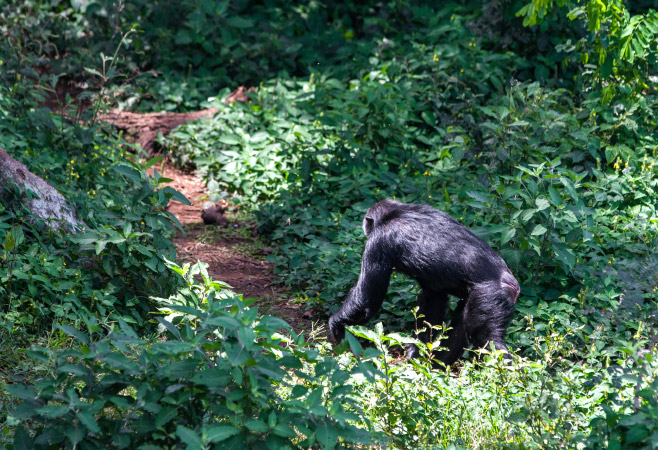
Chimpanzee in Ngamba Island Chimpanzee Sanctuary, on Ngamba Island, Lake Victoria, Uganda
What tourists can expect
Day trips vs overnight stays
- Day trips include round-trip boat rides, chimpanzee feeding viewings, a sanctuary tour and conservation talks.
- Overnight stays give you access to dusk chimp observations, peaceful rainforest ambience and early-morning nature walks.
Feeding times and viewing platforms
Feeding takes place at 11:00 AM and 2:30 PM daily. Visitors watch from elevated platforms, offering safe but intimate views of chimps as they interact, play or squabble over bananas.
Guided nature walks and rainforest trails
For overnight guests, forest walks are a must. Spot birds, monitor lizards, butterflies and maybe even a curious chimp near the boundaries.
Sunset cruises and Lake Victoria views
A golden sunset cruise is available for overnight guests. Swimming and fishing in Lake Victoria are generally discouraged for safety reasons.
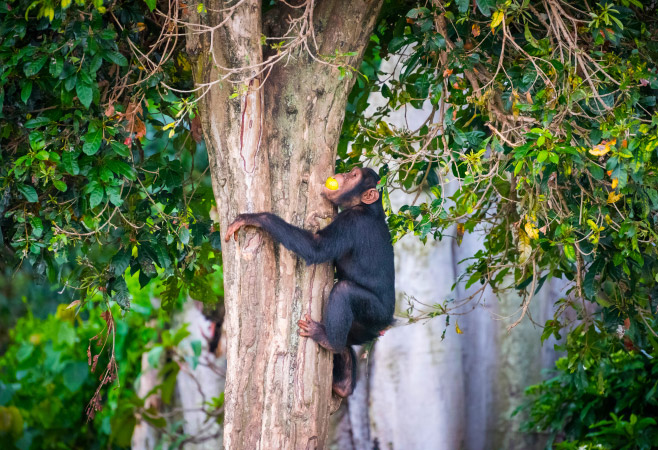
Young chimpanzee climbs on a tree after picking up food in the Ngamba Island Chimpanzee Sanctuary in Uganda
The stars of the Sanctuary - The chimpanzees
Personal stories of rescued chimps
Each chimp has a name and a backstory. For example:
- Tumbo arrived with bullet wounds from poachers.
- Asega was rescued from a nightclub where he was chained and used as entertainment.
These stories are shared during your visit, making the experience deeply personal.
Note: Each chimpanzee has a personal rescue story - such as individuals once orphaned by poachers or confiscated from illegal trade. These stories are shared during your visit, making the experience deeply personal.
Chimpanzee social life and behaviors
Watch how these primates form hierarchies, use tools, tease each other and build nests. It’s like observing a mirror of our own behavior - but through a wild and whimsical lens.
Conservation through care and enrichment
Beyond food and shelter, chimps enjoy toys, climbing structures and behavioral puzzles. It’s not a zoo - it’s a refuge designed to replicate forest life.
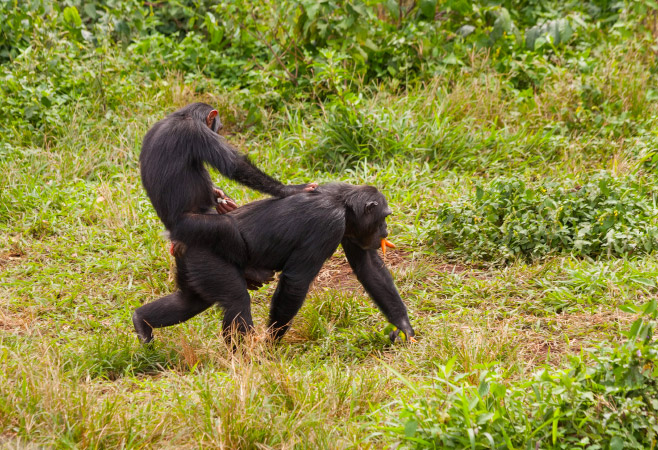
A young chimpanzee straddles its mother’s back. Ngamba island chimpanzee sanctuary, Uganda
Accommodations on the Island
Ngamba eco-lodge
Eco-lodges use solar power, composting toilets and other eco-friendly systems. Cabins include hot showers, mosquito nets and private decks with spectacular sunrise views.
Ideal for nature lovers and romantic getaways.
Camping by the lake
Budget-conscious or adventurous travelers can opt for tented camping - with staff on site, campfires at night and the sounds of chimps calling in the dark.
Visitor information & pricing
Entry fees and tour package
- Day Trip: $110–$365 per person depending on group size
- Overnight: $300 to $600 per person, including meals, lodging and boat transport
- Children (5–15 years): 50% discount
- Ugandans and East African residents receive local rates
Booking and what’s included
Tickets include:
- Roundtrip boat transport
- Sanctuary tour
- Feeding time access
- Educational talk
- Conservation certificate (souvenir!)
Advanced online booking is recommended, especially during peak months.
Volunteer and educational opportunities
Tourists as conservation ambassadors
Volunteers can help with daily routines: preparing chimp food, maintaining trails or assisting in educational tours. No degree required - just a passion for wildlife.
Student internships and long-stay options
For biology, veterinary or eco-tourism students, Ngamba offers multi-week internships. Ideal for research, thesis work or gap-year projects.
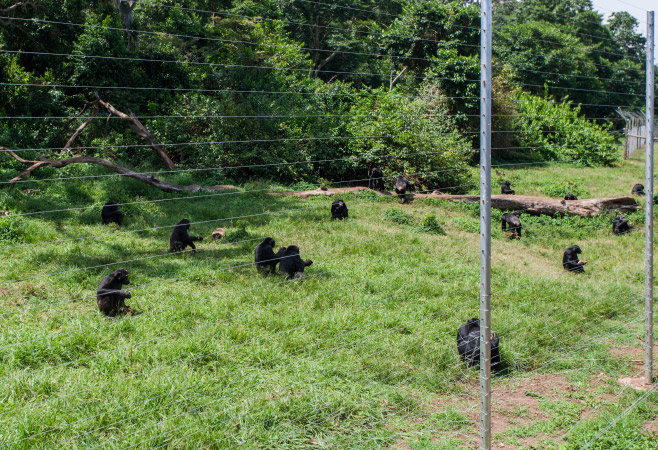
Chimpanzees thriving in their natural sanctuary on Lake Victoria
Nearby attractions for itinerary planning
Visit to Entebbe Town
Before or after Ngamba, explore:
- Botanical Gardens
- Local craft markets
- Victoria Mall
Uganda Wildlife Education Centre (UWEC)
Also in Entebbe, this facility offers a mini-safari experience with lions, giraffes, zebras and more. Perfect for families.
Tips for a smooth visit
What to pack and wear
- Lightweight, breathable clothing
- Hat, sunscreen and insect repellent
- Closed shoes for nature walks
- Rain jacket (just in case)
Photography, Wi-fi and accessibility
- Photography is allowed - no flash.
- No strong Wi-fi on the island - disconnect and embrace nature.
- The sanctuary is moderately wheelchair accessible; inquire in advance for specific needs.
FAQs (Tourist-centric)
- Can children visit Ngamba Island?
Yes, kids aged 5 and above are welcome. It’s a fantastic educational trip for families.
- Are meals included in the overnight stay?
Absolutely. Overnight packages include dinner, breakfast and refreshments - all served with a view of Lake Victoria.
- Is Ngamba Island safe to visit?
Yes. The island is secure, well-staffed and health protocols are in place. Chimpanzees are observed from safe distances.
- Can I swim or fish in Lake Victoria while there?
Swimming is discouraged due to bilharzia and safety concerns. Fishing may be allowed under guided conditions - ask your lodge.
- How long in advance should I book?
At least 1–2 weeks in advance during low season and 3–4 weeks ahead during peak months (July - August, December).
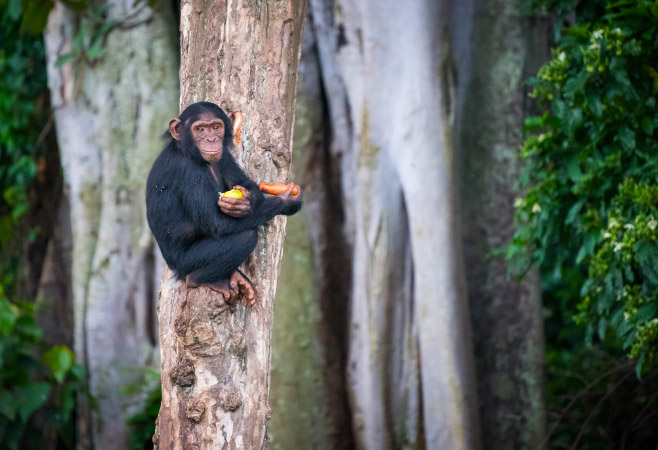
Chimpanzees solve puzzles and climb high in this sanctuary built for learning, healing and living freely
Conclusion
Ngamba Island Chimpanzee Sanctuary is not just a tourist attraction site, but a life-changing experience into the world of primates, conservation and responsible tourism. Each time you come to stay a couple of hours or a couple of nights, you will take away memories, inspiration and a new sense of purpose. Each ticket, each photo and each hand raised in support of these rescued chimps is forever remembered. Leave as an advocate of conservation - come as a traveler.
Related Articles
- Entebbe Botanical Gardens Entrance Fee to Uganda’s Green Paradise
- Uganda Reptile Village: Where the Wild Side of Nature Gets Scaly
- Ngamba Island Chimpanzee Sanctuary: Uganda’s Primate Paradise
- Uganda Wildlife Conservation Education Centre: Where Learning Meets Adventure
- Pearl Crafts Village Uganda: A Colorful Stop You Shouldn’t Miss
- Mabamba Swamp Bird Watching: A Wild Adventure You’ll Never Forget
- Hot Air Balloon in Uganda: Best safari locations & tips for tourists
- Budongo Forest in Uganda: Chimpanzee trekking guide
- Accommodation in Uganda: Best hotels, lodges, campsites











